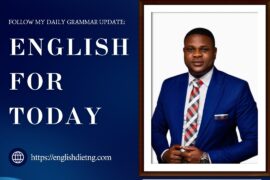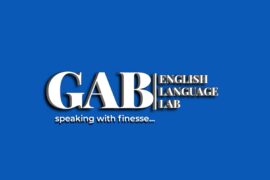English for Today by Ganiu Abisoye Bamgbose (GAB)
USES OF MODAL AUXILIARY VERBS
1. CAN performs the following functions:
a. It expresses permission: You can wear my pair of trousers to office.
b. It shows capacity or ability: Kunle can kill a lion.
2. COULD performs the following functions:
a. It serves as the past tense of can: Kunle could kill a lion as a young man.
b. It is used to express politeness: Could you excuse me please?
3. MUST performs the following functions:
a. It expresses probability: Joy did well in her exam. She must have attended a good extramural lesson.
b. It expresses certainty: Every man born of a woman must die
c. It expresses obligation: You must balance your account before leaving the bank.
d. It expresses necessity: You must live a holy life to have an open access to God.
4. Ought to: It has only one form and it is commonly used to express an obligation that is right, advisable, or desirable: We ought to have visited the governor. You ought to have married the man that sponsored your education.
5. May: It performs the following functions:
a. It is used to indicate or ask for permission: May I bring the chairs into the hall?
b. It is used to indicate possibility: This coat may be Peter’s.
c. It shows purpose: I will look into my schedule so that Kunle may know when to expect me.
d. It expresses wishes and hopes: May you live long to reap the fruits of your labour.
To be continued…
Ganiu Abisoye Bamgbose (GAB)
Academic Advisor, Distance Learning Centre, University of Ibadan;
&
Doctoral Student of English, University of Ibadan.

